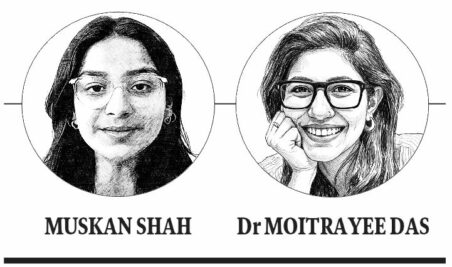Opinion: Gender bias in care work
IIT Kharagpur's ‘Campus Mothers’, though much-needed, risks perpetuating gender bias in care work and emotional labour

By Muskan Shah, Dr Moitrayee Das
IIT Kharagpur, the first and oldest Indian Institute of Technology, is an institution renowned globally for its excellence in education and research. With 21 hostels housing 16,000 students, the campus is home to some of the greatest scholars and top-ranking students from around the country and globe. So, what does it mean when an institution like this appoints ‘Mothers’ for care work on campus?
Also Read
On 24 July 2025, IIT Kharagpur newsroom announced ‘Campus Mothers’, a two-pronged approach intended to improve student well-being on the campus. The programme combines AI-driven monitoring tools and trained female faculty as well as female staff families to provide emotional support to students at the institute. The initiative is one of its kind and much needed, considering the recent data on student mental health, including three student suicides on the campus within the last year.
However, discourse around the initiative calls for examination of the initiative through a gendered and psychological lens, emphasising the role of institutions in perpetuating the gender bias in care work and emotional labour.
Emotional support should be a system, built on a collective foundation, not a sacrifice made by female faculty
A ten-person mental health committee would come up with improvements to boost student mental health. The initiative proposes training in basic counselling skills and emotional recognition for the campus ‘Mothers’. Post the preliminary orientation, the role of the trained women is rather informal– conversing with students, offering tea to them, going out on weekends, and building trust outside clinical settings, among others. The trained individuals would be stationed at campus spaces such as hostels and cafeterias. AI would monitor students when there are stress signals, acting as a complementary tool to human intervention.
Feminised Work
Traditionally, care work has always been symbolically and materially feminised. Employers tend to designate women into what is perceived as a caregiving role. In educational institutes, this has resulted in female faculty, often senior female faculty, being placed in the role of a ‘Mother’ for the campus. Arlie Hochschild, an American sociology professor emeritus, coined the term emotional labour, which refers to employees working to display emotions like empathy, patience, and availability to fulfil emotional requirements of a job, while suppressing genuine feelings (Hochschild, 1983).
While 53 per cent of individuals filling these roles are women, only 32 per cent are men (Bhave & Glomb, 2010). When only female faculty and staff are expected to provide emotional support to students of all genders, providing emotional labour without compensation, it begs the question of why men are being excluded from these roles? Could initiatives that equally appoint faculty of both genders have diffused the gender burden more fairly? A feminist perspective of the initiative reveals the risk of the movement reinforcing benevolent sexism.
Though the appointment of women as ‘Mothers’ seems to be positive and progressive, it ultimately remains harmful, promoting attitudes towards women that are rooted in traditional gender roles, while also limiting their autonomy and ability to fulfil their academic roles. Lack of formally recognising the work taken on by the trained ‘Mothers’ or even fairly compensating them adds to the issue, invisibilising unpaid care work and presenting it as an extension of the faculty’s role, rather than another skilled job as a whole.
Between 2019 and 2023, there were 39 reported suicides in IITs across the country (Mukherjee, 2023). There were five suicides reported in IIT Delhi in the academic year 2023-24, and four in the past seven months in IIT Kharagpur (Kuntamalla, 2025). Contributory factors include discrimination, bullying, burnout, caste bias, and toxic competition, to name a few. Students travel to IITs from different corners of the country, and often lack empathetic relationships that can constitute a secure base from which they can explore and recover.
Attachment Theory
As per the attachment theory in psychology, having these kinds of anchors can help individuals adapt to the new environment and stressors, acting as a buffer from anxiety, burnout, and loneliness. The availability of emotionally available and trained adults in such high-stress academic environments is evidently the need of the hour. The core premise of the initiative of ‘Campus Mothers’ does respond to this gap.
However, considering the unique factors that play a role in building the stressful environment of institutes like IITs, the question of preparedness arises. Are employed women provided with the specialised skills needed to provide psychological first aid? Are they aware of trauma-informed approaches? While working with impressionable young adults, a lack of training can result in inadvertently causing more harm than good. Care should be provided while considering psychological insight, ethics, and shared institutional responsibility rather than rooting it in assumed maternalistic traits of a selected cohort of faculty members.
Initiative Worldwide
Alongside the official announcement, there are references made to initiatives for student mental health worldwide. These include the fostering of conversation about mental health at Penn State University and Yale University, and building a mental health services fund, such as the alumni-funded USD 1 million fund at Dartmouth College. Incorporating such practices can go a long way in being sustainable alternatives to ‘Campus Mothers’.
For example, IIT Madras hosts Manam, a peer-to-peer programme to build and maintain relationships with alumni. These efforts can help in reducing mental health stigma and prompting individuals to seek help from and trust the campus mental health systems. It also proposes training mentors of all genders — a move that could ensure enough mentors also ensure greater comfort among students to be able to interact with same sex mentors. Further, introducing campus-wide mental health literacy programmes and peer mentoring can help in distributing emotional labour equitably while reducing stigma and fostering understanding on a collective community level.
Introduction of caregiving programmes must ensure adequate psychological first aid and trauma-informed training while recognising and compensating the emotional labour. By doing so, as a leading institute, IIT Kharagpur can move beyond symbolic gestures, responsibly inculcating emotional well-being programmes into the campus ecosystem.
Rather than creating a patchwork solution, the areas where existing counselling centres are failing should be explored, ensuring that a systemic issue is not individualised and swept under the carpet. Emotional support should be a system, built on a collective foundation, not a sacrifice made by female faculty.

(Muskan Shah is postgraduate student at Christ University, and Dr Moitrayee Das is Assistant Professor of Psychology at FLAME University, Pune)
Related News
-
Businessman killed in car accident on Medak-Hyderabad road
7 seconds ago -
Modi, Macron vow deeper defence, trade partnership
9 hours ago -
Sports briefs: Dharani, Tapasya clinch honours
9 hours ago -
Man arrested for cultivating ganja plants in Telangana’s Adilabad
9 hours ago -
Second successive win for Titans in Samuel Vasanth Kumar basketball
9 hours ago -
Women councillors allege misconduct by Congress in Kyathanpalli
9 hours ago -
Gauhati Medical College doctor lodges FIR alleging harassment by principal
9 hours ago -
Two FIRs filed in Chikkamagaluru after week-long stone pelting on house
9 hours ago




